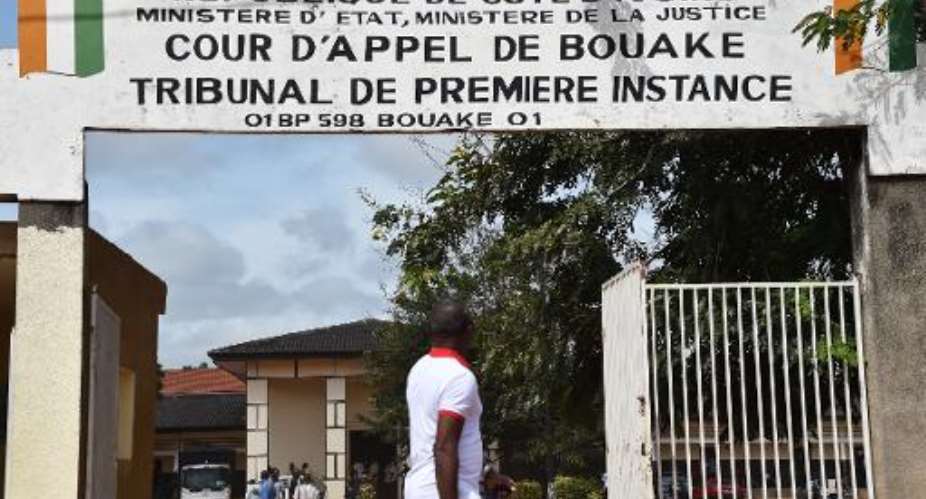Bouaké (Ivory Coast) (AFP) - Aicha sinks shyly behind her school desk as visitors come to see the unwilling heroine in a landmark lawsuit: her father is the first man ever tried in Ivory Coast over childhood marriage.
On Wednesday, a court will rule whether he spends the next year in prison, a sentence the prosecutor called "lenient" but an unprecedented signal to stop the impunity child marriage now enjoys in this west African state where it is illegal -- but widespread.
With her blue-and-white gingham uniform, black scarf tied around her hair, Aicha -- not her real name -- appears older than her 11-year-old classmates.
It was the school director who, reporting her absence, unknowingly thwarted the plan to wed Aicha to one of her father's cousins, 16 years her elder.
"We want to send a strong message," Rosine Kone, acting prosecutor in the case in the central city of Bouake, told AFP. "We must encourage people to denounce this sort of practice.
"Tradition, morality and religion are used to justify forced or early marriages," she said. "But each time we hear about a case from now on, we'll fight to the end."
She has also asked that the father pay a 360,000 CFA (500 euros, $635) fine.
A drop in the bucket, or a real start against a practice that each year involves 15 million girls under 18 worldwide, according to Girls Not Brides, a global partnership of more than 400 civil society organisations.
The United Nations has called for urgent action to end child marriage, still practiced in more than 40 countries -- including 30 in Africa alone -- where it affects more than 30 percent of all girls.
Ivory Coast has some of the highest rates: 12 percent of all girls are wed before their 15th birthday and 36 percent before the age of 18, according to a report by the UN Children's Fund, UNICEF, to be published shortly.
When Aicha failed to show up for class earlier this month, school director Baba Coulibaly contacted the rights group Jakawili, or "Solidarity" in the Malinke language, which in turn notified police.
Police sent to investigate found Aicha "wearing a veil" during a marriage ceremony, though the groom was not present.
Aicha's father was detained for 10 days then tried last week with planning the "forced and premature union" of his daughter.
He told the court he had no idea marriage was forbidden for minors, in a trial that pitted distant worlds -- tradition as entrenched in often poor, rural, remote and heavily Muslim areas, against modern legal notions of paedophilia and human rights.
"My family took the decision," he told the court, saying he was only 37 and part of a huge family. "I could have opposed it but my daughter agreed, but today I wonder if this was indeed the case."
- Too long ignored -
Prosecutor Kone, however, stood firm.
"Morally, without even considering the law, when you look at your 11-year-old daughter, do you honestly think you can give such a young girl in marriage?" she challenged the man.
"She is not 11 but 14," the father cried, saying she was in a younger class as she was "a little slow".
"It's the Muslim religion that recommends this," his brother Moussa Toure told AFP, baffled.
"It says when a woman has her first menstrual period, she can marry. Our own mother was married at age 9."
Traditionally, the practice is justified to prevent any "shame" of pregnancy outside wedlock. But "in reality families often marry the girls to rich merchants to protect themselves from need," said Martin Kouassi, Jakawili project coordinator who said his group has prevented seven child marriages this year against 20 last year.
"It's just another form of trade," he railed.
For the UN and rights' groups, the practice, too long ignored, robs girls of education and exposes them to potential violence and death, with early and repeated pregnancies.
When Aicha returned to school "it was not at all easy. We had to reassure her and tell her that everything that happened was not her fault," said director Coulibaly.
For Pauline Kouye of the UN Population Fund (UNFPA), the trial of Aicha's father is "the result of a long legal combat" but she said the battle is far from won.
When Ivory Coast started fighting female circumcision, it carried on, secretly, "not in the usual initiation ceremonies" for adolescents but "on babies".
In the same way, Kouye fears people will "circumvent the law to keep marrying children".
UNFPA has so far trained 205 community leaders, as a first step to try to rid Ivory Coast of the practice.





 Saglemi Housing Project will not be left to rot – Kojo Oppong Nkrumah
Saglemi Housing Project will not be left to rot – Kojo Oppong Nkrumah
 Transport fares hike: GPRTU issue two-day ultimatum
Transport fares hike: GPRTU issue two-day ultimatum
 ARC endorses Alan as presidential candidate – Buaben Asamoa
ARC endorses Alan as presidential candidate – Buaben Asamoa
 Akufo-Addo appoints Kwasi Agyei as new Controller and Accountant-General
Akufo-Addo appoints Kwasi Agyei as new Controller and Accountant-General
 PNC dismiss reports of mass resignations
PNC dismiss reports of mass resignations
 PAC advocates for revenue collectors to be engaged on commission basis, not full...
PAC advocates for revenue collectors to be engaged on commission basis, not full...
 Genser Energy commissions 110km of natural gas pipeline at Anwomaso
Genser Energy commissions 110km of natural gas pipeline at Anwomaso
 Naa Torshie calls for tolerance, peace ahead of 2024 election
Naa Torshie calls for tolerance, peace ahead of 2024 election
 Asantehene commends Matthew Opoku Prempeh for conceiving GENSER Kumasi Pipeline ...
Asantehene commends Matthew Opoku Prempeh for conceiving GENSER Kumasi Pipeline ...
 Let’s do away with ‘slash and burn politics’ in Ghana — Dr Adutwum
Let’s do away with ‘slash and burn politics’ in Ghana — Dr Adutwum
